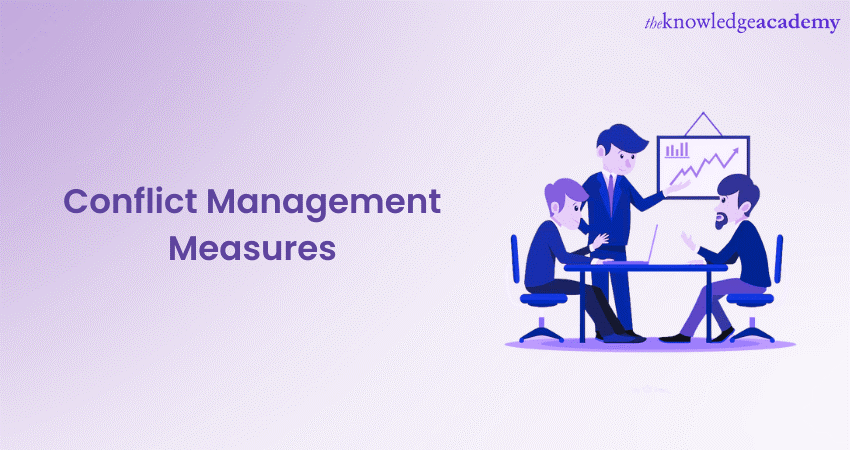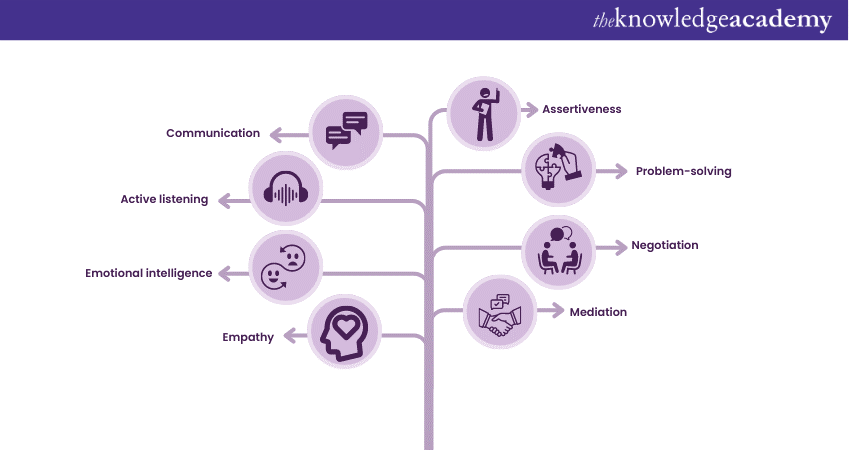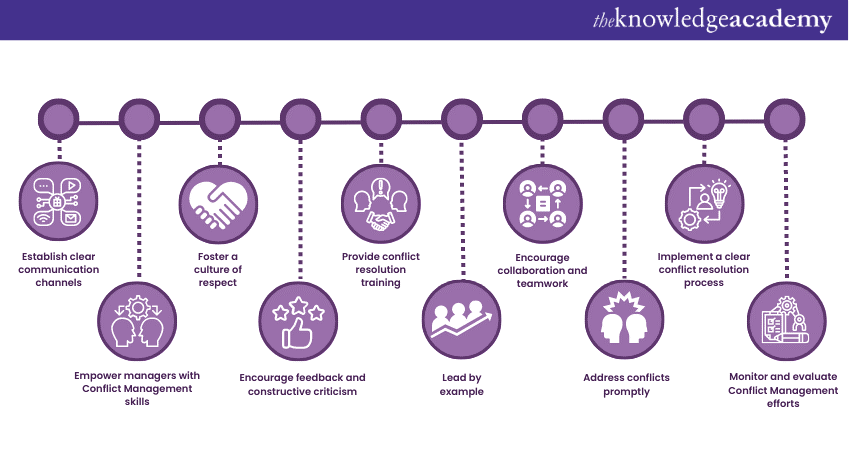We may not have the course you’re looking for. If you enquire or give us a call on 01344203999 and speak to our training experts, we may still be able to help with your training requirements.
We ensure quality, budget-alignment, and timely delivery by our expert instructors.

Conflict Management is the process of effectively addressing and resolving conflicts constructively and positively. The measures of Conflict Management involve implementing strategies, techniques, and measures to navigate disagreements and disputes, aiming for mutual understanding and resolution.
Additionally, Conflict Management Measures foster open communication, empathy, and collaboration. This allows individuals and organisations to turn conflicts into opportunities for growth, improved relationships, and productive outcomes. Further, this blog will explain Conflict Management Measures and define a Conflict Manager as a professional with a very assertive attitude to achieve his or her own goals.
Table of Contents
1) Overview of Conflict Management
2) Skills involved in Conflict Management
3) Exploring the Measures for effective Conflict Management
4) How to implement Conflict Management IN the workplace?
5) Conclusion
Overview of Conflict Management
Conflict Management is the process of effectively handling disagreements, disputes, or conflicts that arise between individuals or groups. It involves strategies and techniques aimed at addressing conflicts in a constructive and productive manner, with the goal of finding mutually satisfactory solutions.
Additionally, the emphasis is not on avoiding or suppressing conflicts but rather on managing them in a way that promotes understanding, collaboration, and positive outcomes. It recognises that conflicts are a natural part of human interaction and can arise due to differences in perspectives, values, goals, or interests.
Furthermore, effective Conflict Management requires strong communication skills, active listening, empathy, and the ability to understand multiple viewpoints. It involves identifying the root causes of conflicts, exploring possible solutions, and facilitating open dialogue between conflicting parties.Collaboration, negotiation, and compromise are often the key components of Conflict Management.
Moreover, conflict management is essential in various contexts, including the workplace, relationships, and community settings. The Conflict Management Cycle helps maintain healthy relationships, enhances teamwork and productivity, and prevents conflicts from escalating into destructive or damaging situations.

Skills involved in Conflict Management
Conflict Management requires a range of skills to effectively address and resolve conflicts. These skills are crucial in implementing Conflict Management Measures and creating positive outcomes. Here are some key skills involved in Conflict Management:

a) Communication: Effective communication is essential in Conflict Management. It involves expressing oneself clearly and listening actively to others' perspectives. Good communication helps foster understanding, promotes empathy, and facilitates constructive dialogue between individuals.
b) Active listening: It is a vital skill that involves fully engaging with the speaker, focusing on their words, and seeking to understand their point of view. It mainly helps in comprehending the underlying concerns, emotions, and needs of conflicting parties.
c) Emotional intelligence: Emotional intelligence plays a crucial role in Conflict Management. It involves recognising and understanding one's emotions and those of others. Emotional intelligence helps manage emotions during conflicts, remain calm, and respond empathetically.
d) Empathy: Empathy enables individuals to understand and share the feelings and perspectives of others involved in the conflict. It helps in building rapport, developing trust, and finding common ground for resolution.
e) Assertiveness: Being assertive means expressing one's needs, opinions, and boundaries while respecting others' rights. Assertiveness allows individuals to communicate effectively, stand up for themselves, and address conflicts directly and respectfully.
f) Problem-solving: Conflict Management often requires problem-solving skills to identify the root causes of conflicts and explore possible solutions. Analytical thinking, creativity, and the ability to generate win-win outcomes are crucial in effective problem-solving.
g Negotiation: Negotiation involves finding a compromise or mutually acceptable solution to conflicts. It requires active participation, flexibility, and the ability to find common ground while considering the interests of all parties involved.
h) Mediation: Mediation is a skill that involves facilitating communication and negotiation between conflicting parties, acting as a neutral third party. Mediators help guide the process, encourage understanding, and assist in finding resolutions that meet the needs of all parties.
Acquire the knowledge to manage conflicts in an organisation by signing up for the Conflict Management Training Course now!
Exploring the Measures for effective Conflict Management
Here is a list of the most important measures that individuals implement for effective Conflict Management:
a) Eliminating the cause of conflict: Addressing the underlying causes of conflict is crucial. Individuals can identify and resolve the root issues, such as miscommunication, differing goals, or resource scarcity, thereby reducing the potential for future conflicts.
b) Proactively managing conflict: Rather than waiting for conflicts to escalate, proactive Conflict Management involves early intervention and addressing conflicts as soon as they arise. This approach helps prevent the escalation of conflicts and minimises potential negative consequences.
c) Maintaining a positive attitude: A positive attitude towards Conflict Management fosters an environment of openness and collaboration. It involves approaching conflicts with the mindset of finding mutually beneficial solutions and maintaining respect for all parties involved.
d) Persuading effectively: Persuasion skills play a crucial role in Conflict Management. Being able to articulate viewpoints, present compelling arguments, and influence others in a respectful manner can facilitate the resolution of conflicts.
e) Maintaining flexibility: Flexibility allows for adaptability in Conflict Management. Being open to alternative solutions, considering different perspectives, and being willing to compromise are important aspects of managing conflicts effectively.
f) Broadening the focus of interest: Shifting the focus of the conflict from individual interests to shared interests can help find common ground and promote collaboration. By identifying shared goals and emphasising cooperation, the conflicting parties can work towards a mutually satisfactory resolution.
g) Departing the field: In some cases, it may be necessary to step away temporarily from the conflict to de-escalate tensions. Temporarily disengaging from the conflict allows conflicting parties to cool down, reflect, and approach the resolution process with a fresh perspective.
h) Tolerating the conflict temporarily: Tolerating the conflict temporarily means acknowledging that conflicts are a natural part of human interaction and accepting that resolution may take time. It involves managing the conflict while maintaining a respectful and professional atmosphere.
i) Acceptance of truth: Accepting the truth involves acknowledging facts, recognising differing perspectives, and being open to understanding alternative viewpoints. This measure fosters empathy and mutual understanding and paves the way for conflict resolution.
j) Re-establishing trust: Conflicts can erode trust between individuals or groups. Re-establishing trust is essential for effective Conflict Management. It involves rebuilding relationships, demonstrating reliability, and fostering open communication to restore confidence and cooperation.
k) Communicating effectively: Effective communication is vital in Conflict Management. It includes active listening, expressing thoughts and feelings clearly, and seeking to understand the perspectives of others. Clear and open communication facilitates mutual understanding and promotes resolution.
l) Appointing an external committee: In complex or persistent conflicts, appointing an external committee or mediator can be beneficial. A neutral third party can provide an unbiased perspective, mediate discussions, and guide the conflicting parties towards a mutually agreeable solution.
Foster the spirit of collaboration and compromise by signing up for the Conflict Resolution and Negotiation for Change Training Course now!
How to implement Conflict Management IN the workplace?
The implementation of Conflict Management at the workplace is vital for maintaining a positive and productive work environment. Here are some key points on how to implement Conflict Management effectively:

a) Establish clear communication channels: Create open lines of communication to encourage employees to express their concerns and grievances. Transparent communication channels can include regular team meetings, suggestion boxes, or one-on-one sessions with managers.
b) Foster a culture of respect: Promote a culture that values respect, inclusivity, and open-mindedness. Encourage a mindset of respect among your employees, regardless of their differences or conflicting viewpoints.
c) Provide conflict resolution training: Offer conflict resolution training programs to equip employees with the necessary skills and techniques for managing conflicts effectively. The techniques can include communication skills, active listening, negotiation, and problem-solving strategies.
d) Encourage collaboration and teamwork: Foster a collaborative work environment where employees are encouraged to work together towards common goals. Emphasise the importance of teamwork and provide opportunities for team-building activities.
e) Implement a clear conflict resolution process: Establish an Effective Conflict Management Steps framework that outlines a structured resolution process to address conflicts. This process should offer clear guidance on reporting, investigating, and resolving conflicts while ensuring fairness and transparency.
f) Empower managers with Conflict Management skills: Train managers and supervisors in Conflict Management techniques, as they play a critical role in addressing and resolving conflicts within their teams. Managers should be skilled in active listening, mediation, and problem-solving.
g) Encourage feedback and constructive criticism: Create a feedback culture where employees feel comfortable providing constructive criticism to address potential conflicts before they escalate. Encourage open dialogue and provide mechanisms for anonymous feedback if necessary.
h) Lead by example: Leadership should exemplify positive Conflict Management behaviours. Moreover, leaders should demonstrate effective communication, active listening, and problem-solving skills, serving as role models for employees.
i) Address conflicts promptly: Deal with conflicts as soon as they arise to prevent them from escalating. Encourage employees to report conflicts promptly and ensure they are addressed in a timely and fair manner.
j) Monitor and evaluate Conflict Management efforts: Continuously monitor the effectiveness of Conflict Management strategies and assess their impact on the work environment. More importantly, adjust and refine your approaches as needed to enhance conflict resolution outcomes. This is crucial when preparing for Conflict Management interview questions to ensure a comprehensive understanding of handling workplace disputes.
Want to handle conflicts effectively? Prepare with our top Conflict Management Interview Questions and stand out!
Conclusion
Conflict Management is a vital skill that enables individuals and organisations to navigate disagreements and disputes in a constructive manner. In addition, using effective strategies for managing conflicts, promoting open communication, and developing skills for resolving conflicts can help address conflicts in a proactive manner.
Gain the knowledge to convey your message effectively by signing up for the Communication Skills Training now!
Upcoming Business Skills Resources Batches & Dates
Date
 Conflict Management Training
Conflict Management Training
Fri 11th Apr 2025
Fri 13th Jun 2025
Fri 15th Aug 2025
Fri 10th Oct 2025
Fri 12th Dec 2025






 Top Rated Course
Top Rated Course


 If you wish to make any changes to your course, please
If you wish to make any changes to your course, please


